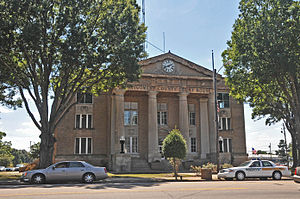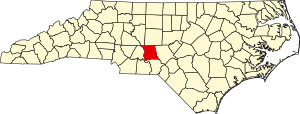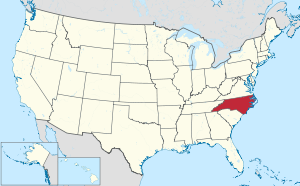Montgomery County is a rural county located in the southern Piedmont of the U.S. state of North Carolina. As of the 2020 census, the population was 25,751.[1] Its county seat is Troy.[2]
Montgomery County | |
|---|---|
 | |
| Motto: "The Golden Opportunity" | |
 Location within the U.S. state of North Carolina | |
 North Carolina's location within the U.S. | |
| Coordinates: 35°20′N 79°55′W / 35.33°N 79.91°W | |
| Country | |
| State | |
| Founded | 1779 |
| Named for | Richard Montgomery |
| Seat | Troy |
| Largest community | Troy |
| Area | |
• Total | 501.54 sq mi (1,299.0 km2) |
| • Land | 491.54 sq mi (1,273.1 km2) |
| • Water | 10.00 sq mi (25.9 km2) 1.99% |
| Population (2020) | |
• Total | 25,751 |
• Estimate (2023) | 26,085 |
| • Density | 52.68/sq mi (20.34/km2) |
| Time zone | UTC−5 (Eastern) |
| • Summer (DST) | UTC−4 (EDT) |
| Congressional district | 8th |
| Website | www |
History
editThe first inhabitants of the area eventually comprising Montgomery County were Keyauwee and Cheraw Native Americans. The first European settlers were German and Scottish.[3]
Montgomery County was created in 1779 out of Anson County. It was named in honor of Richard Montgomery, an American Revolutionary War general killed in 1775 while attempting to capture Quebec City, Canada. The law establishing the county also directed a group of commissioners to secure land near the center of the county for the construction of a country courthouse and prison. Many residents were dissatisfied with the location chosen, and after several years of demurring on a decision, a courthouse was erected in the community of Henderson, created at the confluence of the Yadkin and Uwharrie rivers in 1794.[4] In 1816, the old courthouse was sold another was erected at the new community of Laurenceville.[5] In 1841, the portion of Montgomery County west of the Yadkin/Pee Dee River became Stanly County.[6] Two years later, commissioners were selected to move the courthouse to Montgomery's geographic center, and in 1844 Troy was established as the county seat.[7]
The county's first paved roads were established in the 1920s. The Great Depression, which began in 1929, had a large adverse impact on the local agricultural and manufacturing industries. By 1933, 30 percent of local residents were unemployed.[8]
Geography
editAccording to the U.S. Census Bureau, the county has a total area of 501.54 square miles (1,299.0 km2), of which 491.54 square miles (1,273.1 km2) is land and 10.00 square miles (25.9 km2) (1.99%) is water.[9] Montgomery is bordered by Davidson, Moore, Richmond, Randolph, and Stanly counties. Most of the county lies within the Yadkin-Pee Dee River Basin, with some smaller areas lying within the Cape Fear and Lumber River basins. The Uwharrie National Forest encompasses a large swathe of the county.[3]
State and local protected areas/sites
edit- Pee Dee River Game Land (part)[10]
- Roy J. Maness Nature Preserve
- Town Creek Indian Mound State Historic Site
- Uwharrie Game Land (part)[10]
- Yadkin River Game Land (part)[10]
Major water bodies
editDemographics
edit| Census | Pop. | Note | %± |
|---|---|---|---|
| 1790 | 5,039 | — | |
| 1800 | 7,677 | 52.4% | |
| 1810 | 8,430 | 9.8% | |
| 1820 | 8,693 | 3.1% | |
| 1830 | 10,919 | 25.6% | |
| 1840 | 10,780 | −1.3% | |
| 1850 | 6,872 | −36.3% | |
| 1860 | 7,649 | 11.3% | |
| 1870 | 7,487 | −2.1% | |
| 1880 | 9,374 | 25.2% | |
| 1890 | 11,239 | 19.9% | |
| 1900 | 14,197 | 26.3% | |
| 1910 | 14,967 | 5.4% | |
| 1920 | 14,607 | −2.4% | |
| 1930 | 16,218 | 11.0% | |
| 1940 | 16,280 | 0.4% | |
| 1950 | 17,260 | 6.0% | |
| 1960 | 18,408 | 6.7% | |
| 1970 | 19,267 | 4.7% | |
| 1980 | 22,469 | 16.6% | |
| 1990 | 23,346 | 3.9% | |
| 2000 | 26,822 | 14.9% | |
| 2010 | 27,798 | 3.6% | |
| 2020 | 25,751 | −7.4% | |
| 2023 (est.) | 26,085 | [1] | 1.3% |
| U.S. Decennial Census[11] 1790–1960[12] 1900–1990[13] 1990–2000[14] 2010[15] 2020[1] | |||
2020 census
edit| Race | Number | Percentage |
|---|---|---|
| White (non-Hispanic) | 16,504 | 64.0% |
| Black or African American (non-Hispanic) | 4,192 | 16.28% |
| Native American | 76 | 0.3% |
| Asian | 391 | 1.52% |
| Pacific Islander | 2 | 0.01% |
| Other/Mixed | 662 | 2.57% |
| Hispanic or Latino | 3,924 | 15.24% |
As of the 2020 census, there were 25,751 people, 10,195 households, and 6,788 families residing in the county.
2000 census
editAt the 2000 census,[17] there were 26,822 people, 9,848 households, and 7,189 families residing in the county. The population density was 55 people per square mile (21 people/km2). There were 14,145 housing units at an average density of 29 per square mile (11/km2). The racial makeup of the county was 69.07% White, 21.84% Black or African American, 0.40% Native American, 1.61% Asian, 0.04% Pacific Islander, 5.75% from other races, and 1.29% from two or more races. 10.43% of the population were Hispanic or Latino of any race.
There were 9,848 households, out of which 31.00% had children under the age of 18 living with them, 55.60% were married couples living together, 12.40% had a female householder with no husband present, and 27.00% were non-families. 24.10% of all households were made up of individuals, and 10.70% had someone living alone who was 65 years of age or older. The average household size was 2.61 and the average family size was 3.080.
In the county, the population was spread out, with 24.90% under the age of 18, 9.00% from 18 to 24, 28.50% from 25 to 44, 23.60% from 45 to 64, and 14.00% who were 65 years of age or older. The median age was 37 years. For every 100 females there were 102.60 males. For every 100 females age 18 and over, there were 100.60 males.
The median income for a household in the county was $32,903, and the median income for a family was $39,616. Males had a median income of $27,832 versus $21,063 for females. The per capita income for the county was $16,505. About 10.90% of families and 15.40% of the population were below the poverty line, including 19.50% of those under age 18 and 17.80% of those age 65 or over.
Law and government
editGovernment
editThe county's government is led by a board of commissioners, is responsible for levying taxes and appropriating county funds, issuing ordinances to regulate resident behavior, and overseeing county government administration.[18] A county manager oversees most regular administrative activities and is responsible for executing the board's wishes.[19]
Montgomery County is a member of the Piedmont Triad Council of Governments, a regional voluntary association of 12 counties,[20] It is located entirely in the North Carolina Senate's 29th district, the North Carolina House of Representatives' 67th district,[21] and North Carolina's 8th congressional district. It is represented in the 118th United States Congress by Dan Bishop (R).
Politics
edit| Year | Republican | Democratic | Third party(ies) | |||
|---|---|---|---|---|---|---|
| No. | % | No. | % | No. | % | |
| 2024 | 9,044 | 68.48% | 4,055 | 30.71% | 107 | 0.81% |
| 2020 | 8,411 | 65.46% | 4,327 | 33.68% | 111 | 0.86% |
| 2016 | 7,130 | 61.79% | 4,150 | 35.96% | 260 | 2.25% |
| 2012 | 6,404 | 57.02% | 4,706 | 41.90% | 121 | 1.08% |
| 2008 | 6,155 | 54.91% | 4,926 | 43.94% | 129 | 1.15% |
| 2004 | 5,745 | 56.99% | 4,313 | 42.79% | 22 | 0.22% |
| 2000 | 4,946 | 55.11% | 3,979 | 44.34% | 49 | 0.55% |
| 1996 | 3,379 | 43.11% | 3,856 | 49.20% | 603 | 7.69% |
| 1992 | 3,543 | 38.67% | 4,422 | 48.27% | 1,196 | 13.06% |
| 1988 | 4,504 | 52.80% | 3,995 | 46.83% | 31 | 0.36% |
| 1984 | 5,109 | 57.07% | 3,831 | 42.79% | 12 | 0.13% |
| 1980 | 3,587 | 45.74% | 4,129 | 52.65% | 126 | 1.61% |
| 1976 | 2,872 | 39.83% | 4,308 | 59.74% | 31 | 0.43% |
| 1972 | 4,417 | 65.67% | 2,175 | 32.34% | 134 | 1.99% |
| 1968 | 3,070 | 39.67% | 2,410 | 31.14% | 2,259 | 29.19% |
| 1964 | 3,385 | 46.26% | 3,933 | 53.74% | 0 | 0.00% |
| 1960 | 3,649 | 52.53% | 3,297 | 47.47% | 0 | 0.00% |
| 1956 | 3,359 | 52.10% | 3,088 | 47.90% | 0 | 0.00% |
| 1952 | 3,181 | 50.04% | 3,176 | 49.96% | 0 | 0.00% |
| 1948 | 1,975 | 43.33% | 2,165 | 47.50% | 418 | 9.17% |
| 1944 | 1,963 | 42.42% | 2,665 | 57.58% | 0 | 0.00% |
| 1940 | 1,789 | 37.30% | 3,007 | 62.70% | 0 | 0.00% |
| 1936 | 2,506 | 41.84% | 3,484 | 58.16% | 0 | 0.00% |
| 1932 | 2,153 | 42.23% | 2,927 | 57.41% | 18 | 0.35% |
| 1928 | 2,653 | 56.82% | 2,016 | 43.18% | 0 | 0.00% |
| 1924 | 2,077 | 45.50% | 2,483 | 54.39% | 5 | 0.11% |
| 1920 | 2,304 | 49.82% | 2,321 | 50.18% | 0 | 0.00% |
| 1916 | 1,196 | 49.46% | 1,222 | 50.54% | 0 | 0.00% |
| 1912 | 144 | 7.19% | 1,012 | 50.55% | 846 | 42.26% |
As of March 2022, 35.9 percent of registered voters in Montgomery County were Republicans, 34.1 percent were registered Democrats, and 29.4 percent were registered unaffiliated.[23]
Economy
editOne of the United States' largest lumber mills, a Jordan Lumber & Supply facility, is located near Mt. Gilead.[24]
Transportation
editInterstate 73/Interstate 74 runs through the eastern portion of Montgomery County. The main east-to-west road route which crosses the county is North Carolina Highway 27.[25] Freight rail service is run by the Aberdeen, Carolina and Western Railway, which operates an east-to-west line through the county which connects to Charlotte and Raleigh, and another which runs south to the Southern Pines/Pinehurst region.[26] Corporate and private airplane facilities are provided by the Montgomery County Airport, located in the eastern portion of the county.[27]
Major highways
edit- US 220
-
US 220 Alt. - NC 24
-
NC 24 Bus. (business route) -
NC 27 Bus. - NC 73
- NC 109
-
NC 109 Bus. (Mount Gilead) -
NC 109 Bus. (Troy) - NC 134
- NC 211
- NC 731
Education
editThe public school system provides five elementary schools (Star, Mt. Gilead, Candor, Page Street, and Green Ridge), two middle schools (West Montgomery and East Montgomery and one high school (Montgomery Central, formed in 2020 by the merger of East Montgomery High and West Montgomery High). Higher education is provided by Montgomery Community College.
Communities
editTowns
edit- Biscoe
- Candor
- Mount Gilead
- Star
- Troy (county seat and largest community)
Townships
edit- Biscoe
- Cheek Creek
- Eldorado
- Little River
- Mount Gilead
- Ophir
- Pee Dee
- Rocky Springs
- Star
- Troy
- Uwharrie
Unincorporated Communities
editNotable people
edit- Beulah Parson Davis (1896–1948), fortune-telling witch
- Henry F. Warner (1923–1944), United States Army World War II Medal of Honor recipient
See also
editReferences
edit- ^ a b c "QuickFacts: Montgomery County, North Carolina". United States Census Bureau. Retrieved March 21, 2024.
- ^ "Find a County". National Association of Counties. Retrieved June 7, 2011.
- ^ a b Powell, William S. (2006). "Montgomery County". NCPedia. North Carolina Government & Heritage Library. Retrieved April 23, 2023.
- ^ Corbitt 2000, p. 152.
- ^ Corbitt 2000, pp. 152–153.
- ^ Corbitt 2000, pp. 154–155.
- ^ Corbitt 2000, p. 153.
- ^ Rosen & Mosnier 2016, p. 7.
- ^ "2020 County Gazetteer Files – North Carolina". United States Census Bureau. August 23, 2022. Retrieved September 9, 2023.
- ^ a b c "NCWRC Game Lands". www.ncpaws.org. Retrieved March 30, 2023.
- ^ "U.S. Decennial Census". United States Census Bureau. Retrieved January 18, 2015.
- ^ "Historical Census Browser". University of Virginia Library. Retrieved January 18, 2015.
- ^ Forstall, Richard L., ed. (March 27, 1995). "Population of Counties by Decennial Census: 1900 to 1990". United States Census Bureau. Retrieved January 18, 2015.
- ^ "Census 2000 PHC-T-4. Ranking Tables for Counties: 1990 and 2000" (PDF). United States Census Bureau. April 2, 2001. Retrieved January 18, 2015.
- ^ "State & County QuickFacts". United States Census Bureau. Archived from the original on June 6, 2011. Retrieved October 27, 2013.
- ^ "Explore Census Data". data.census.gov. Retrieved December 22, 2021.
- ^ "U.S. Census website". United States Census Bureau. Retrieved January 31, 2008.
- ^ "Board of Commissioners". Montgomery County, North Carolina. Montgomery County Government. Retrieved April 27, 2023.
- ^ "Departments : Administration". Montgomery County, North Carolina. Montgomery County Government. Retrieved April 27, 2023.
- ^ "About Us". Piedmont Triad Council of Governments. Retrieved April 27, 2023.
- ^ "Rockingham County Representation : 2023-2024 Session". North Carolina General Assembly. Retrieved April 27, 2023.
- ^ Leip, David. "Dave Leip's Atlas of U.S. Presidential Elections". uselectionatlas.org. Retrieved March 16, 2018.
- ^ Doyle, Steve (March 28, 2022). "NC election season begins with more voters unaffiliated". FOX8 WGHP. Nexstar Media Group. Retrieved May 16, 2023.
- ^ Barkin, Dan (April 26, 2021). "Prices pop amid strong lumber demand and limited sawmills". BusinessNC. Retrieved April 27, 2023.
- ^ "Transportation & Infrastructure : Interstates & Highways". Montgomery County, North Carolina. Montgomery County Government. Retrieved April 27, 2023.
- ^ "Transportation & Infrastructure : Railways". Montgomery County, North Carolina. Montgomery County Government. Retrieved April 27, 2023.
- ^ "Transportation & Infrastructure : Airports". Montgomery County, North Carolina. Montgomery County Government. Retrieved April 27, 2023.
Works cited
edit- Corbitt, David Leroy (2000). The formation of the North Carolina counties, 1663-1943 (reprint ed.). Raleigh: North Carolina Division of Archives and History. OCLC 46398241.
- Rosen, Richard A.; Mosnier, Joseph (2016). Julius Chambers: A Life in the Legal Struggle for Civil Rights. Chapel Hill: The University of North Carolina Press. ISBN 9781469628554.
External links
edit- Geographic data related to Montgomery County, North Carolina at OpenStreetMap
- Official website
- NCGenWeb Montgomery County, genealogy resources for the county
